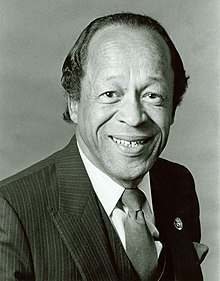Gus Savage
Gus Savage | |
|---|---|
 | |
| Member of the U.S. House of Representatives from Illinois's 2nd district | |
| In office January 3, 1981 – January 3, 1993 | |
| Preceded by | Morgan F. Murphy |
| Succeeded by | Mel Reynolds |
| Personal details | |
| Born | Augustus Alexander Savage October 30, 1925 Detroit, Michigan |
| Died | October 31, 2015 (aged 90) Olympia Fields, Illinois |
| Political party | Democratic |
| Spouse | Eunice King (1946-81; her death) |
| Children | Thomas James, Emma Mae |
| Alma mater | Roosevelt University Chicago-Kent College of Law |
| Military service | |
| Branch/service | United States Army |
| Years of service | 1943–1946 |
Augustus Alexander "Gus" Savage (October 30, 1925 – October 31, 2015) was an entrepreneur, publisher and a Democratic member of the United States House of Representatives from Illinois.[1]
Life and career
Savage was born in Detroit, Michigan, and graduated from Roosevelt University in Chicago. He served in the United States Army from 1943 to 1946 and then worked as a journalist from 1954 to 1979, owning a chain of weekly community newspapers in the Chicago area including the South End Citizen. The Chicago Citizen Newspaper Group became the largest Black-owned chain of weekly newspapers in the Midwest with a circulation of 121,000.
Savage entered political life in 1948 as a Progressive Party organizer. He challenged the local establishment's chosen candidates for the House of Representatives in 1968 and 1970, losing the Democratic primary both times, but won election to the House in 1980, representing the 2nd District on Chicago's South Side for 6 terms, from January 1981 to January 1993.[2]
For the 1992 election, redistricting pushed his district further into Chicago's south suburbs, territory that Savage did not know and that did not know him. He faced a rematch with Mel Reynolds, who had challenged him in the 1988 and 1990[2] primaries. He lost the 1992 election to Reynolds by a margin of 63%-37% after voters in the suburban portion of the district voted overwhelmingly for Reynolds.[3]
In one of his final acts as chairman of the House Subcommittee on Public Buildings and Grounds, excavation and construction at the site of the African Burial Ground in New York City was temporarily halted in 1992, pending further evaluation by the General Services Administration, after Savage was able to leverage his reputation as a national political figure to bring attention to the potential importance of the site. [4]The site was eventually designated a National Historic Landmark in 1993 and a National Monument in 2006 by President George W. Bush.
Savage died on October 31, 2015, one day after his 90th birthday, which he celebrated with his closest friends and family. He is survived by his son Thomas Savage, daughter, Dr. Emma Savage, and grandchildren Thomas Savage Jr., Chyella McBride, and Alexandria Savage.[5]
See also
References
- ^ "SAVAGE, Gus". house.gov. Retrieved 1 November 2015.
- ^ a b Schmidt, William E. (March 21, 1990). "Rep. Savage Claims Victory in Illinois". The New York Times. Retrieved 5 August 2013.
- ^ "THE 1992 CAMPAIGN: Primaries; Brown and Tsongas Search For Victory in Connecticut". New York Times. 1992-03-19.
- ^ Rothstein, Edward (25 February 2010). "A Burial and Its Dead Are Given Life". The New York Times. Retrieved 1 December 2012.
- ^ Chicago Tribune (31 October 2015). "Gus Savage, controversial former congressman, dies at 90". chicagotribune.com. Retrieved 1 November 2015.
External links
- Biography at the Biographical Directory of the United States Congress
- The New York Times Article archives on former Representative Gus Savage (135 articles).
- Gus Savage at Congressional Bad Boys
- Appearances on C-SPAN
- 1925 births
- 2015 deaths
- African-American members of the United States House of Representatives
- African-American military personnel
- African-American people in Illinois politics
- United States Army personnel of World War II
- American newspaper editors
- Editors of Illinois newspapers
- Politicians from Chicago
- Politicians from Detroit
- Illinois Democrats
- Members of the United States House of Representatives from Illinois
- Roosevelt University alumni
- United States Army soldiers
- Democratic Party members of the United States House of Representatives
- 20th-century American politicians
- People from Olympia Fields, Illinois
